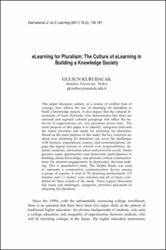eLearning for pluralism: The culture of elearning in building a knowledge society
Özet
This paper discusses culture, as a source of conflict than of synergy, how affects the use of elearning for pluralism to build a knowledge society. It also argues that the cultural dimensions of Geert Hofstede, who demonstrates that there are national and regional cultural groupings that affect the behavior of organizations, are very persistent across time. The main purpose of this paper is to identify, categorize and rank the future priorities and needs for elearning for pluralism. Based on the main purpose of this study, the key concerns are about how elearning for pluralism can cover the challenges with fairness, expectations, respect, and communications; engage the digital citizens in critical civic responsibilities, dynamic academic curriculum plans and powerful social; obtain genuine equal opportunities and democratic participations in building online knowledge; and promote critical communications for elearner-engagements in democratic decision-making. This is quantitative study. The Delphi Study was used to represent a constructive communication device among a group of experts. A total of 28 elearning professionals (14 females and 13 males) were selected and all of them completed all three rounds of the study. These experts discussed top issues and challenges, categories, priorities and needs of elearning for pluralism
Kaynak
International Journal on E-Learning: Corporate, Government, Healthcare, and Higher EducationCilt
10Sayı
2Bağlantı
https://hdl.handle.net/11421/10893Koleksiyonlar
- Makale Koleksiyonu [791]
- Scopus İndeksli Yayınlar Koleksiyonu [8325]


















